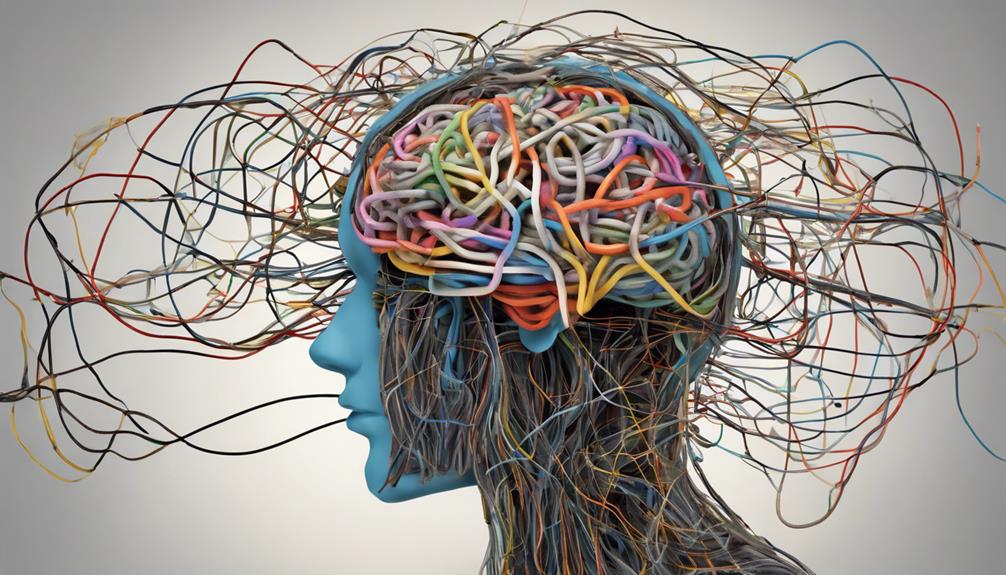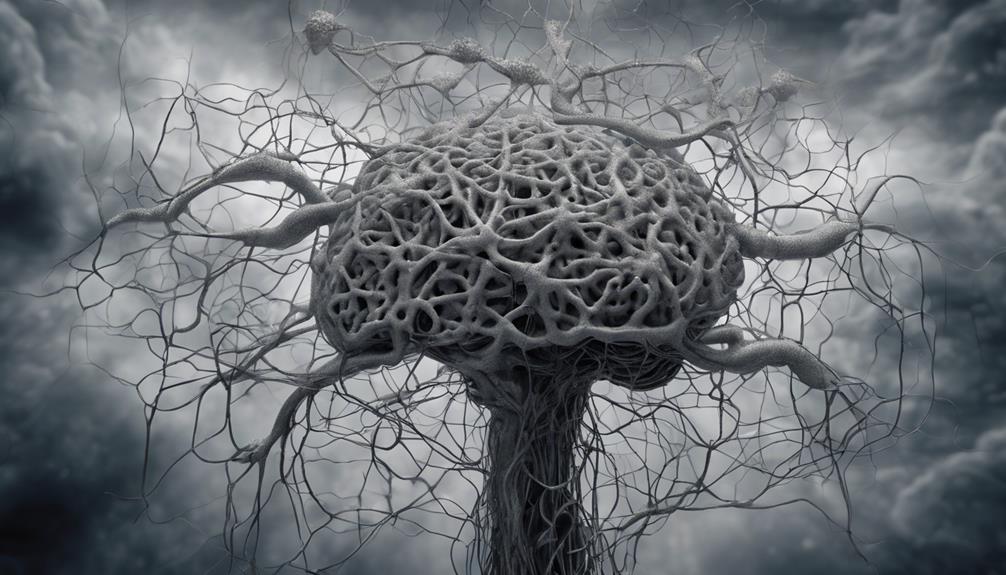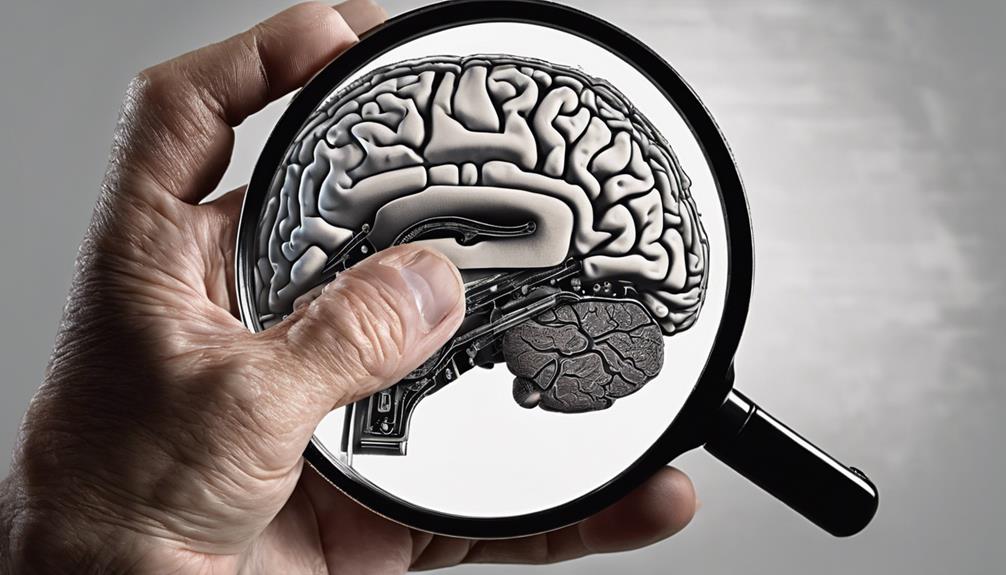Brain fog, which causes mental cloudiness and lack of focus, has connections to Alzheimer’s Disease. Both conditions affect memory and cognitive function. While brain fog can potentially be reversed, Alzheimer’s is a progressive disease. It is crucial to recognize the symptoms of brain fog for early detection of Alzheimer’s. Engaging in strategies such as physical exercise, mental activities, healthy eating, and stress management can benefit cognitive health. Detecting Alzheimer’s in its early stages is vital for providing appropriate support. Monitoring cognitive function helps in the early detection of Alzheimer’s. Understanding the similarities and differences between brain fog and Alzheimer’s is crucial for tailored treatments. Educating oneself about brain health can help in maintaining cognitive abilities and memory.
Key Takeaways
- Brain fog and Alzheimer's both affect memory and cognitive function.
- Brain fog may indicate early Alzheimer's if persistent post-COVID-19.
- Distinguishing symptoms is crucial for tailored treatments and early detection.
- Strategies like exercise and mental stimulation benefit cognitive health.
- Early detection in preclinical stages is vital for appropriate support and management.
Brain Fog Explained
Brain fog, a common cognitive symptom, often leaves individuals feeling mentally clouded and unfocused. This fog can affect memory, making it challenging to recall information or concentrate on tasks. Factors like lack of sleep can contribute to brain fog, impacting our cognitive abilities. When we don't get enough rest, our brains don't have adequate time to recharge, leading to difficulties in thinking clearly and forming memories.
Alzheimer's disease, a severe form of cognitive decline, shares some similarities with brain fog. While brain fog is often temporary and reversible, Alzheimer's is a progressive neurodegenerative disorder that severely affects memory and cognitive function. Understanding the differences between these conditions is essential for early detection and appropriate intervention.
Understanding Alzheimers Disease

Alzheimer's disease advances through stages, each bringing distinct changes in memory and behavior. Understanding these stages can help identify symptoms early and manage them effectively. In its early stage, subtle memory lapses and difficulties with problem-solving may be noticeable, often mistaken for normal aging. As Alzheimer’s progresses, more pronounced cognitive decline occurs, eventually impacting the ability to carry out daily tasks. It is essential to distinguish between Alzheimer’s and other types of dementia, as each can manifest differently and may require tailored approaches for care and management. In the later stages, individuals may experience severe memory loss, disorientation, and changes in personality, requiring full-time care. Unlike other *types of dementia*, such as vascular dementia or Lewy body dementia, Alzheimer’s tends to progress more gradually, though the rate of decline can vary widely among individuals. Early diagnosis and differentiation between these *types of dementia* are crucial for developing personalized care plans, ensuring the best possible outcomes for patients and their families.
Recognizing brain fog symptoms and their potential connection to Alzheimer's progression is important for seeking appropriate medical attention.
Alzheimers Progression Stages
Understanding the progression stages of Alzheimer's disease is essential for recognizing the different levels of cognitive decline and functional impairment that individuals may experience. Alzheimer's disease advances through stages, starting from preclinical when no symptoms are visible but brain changes are present, moving to mild cognitive impairment (MCI) where noticeable cognitive decline is observed while still managing daily activities, and culminating in dementia with severe memory loss and challenges in daily functioning. Early detection during preclinical and MCI stages is vital as it allows for symptom management and potentially slowing down the progression to dementia. Below is a table illustrating the stages of Alzheimer's disease:
| Stage | Description |
|---|---|
| Preclinical | No symptoms, but brain changes present |
| Mild Cognitive Impairment (MCI) | Noticeable cognitive decline, still able to perform daily activities |
| Dementia | Severe memory loss, disorientation, challenges in daily functioning |
Brain Fog Symptoms
Experiencing cognitive issues such as poor thinking and memory problems is common in conditions like depression and stress, often associated with brain fog symptoms. Memory problems can manifest as forgetfulness and difficulty retaining new information, which are early signs of cognitive impairment and potential indicators of dementia, including Alzheimer's disease.
Recognizing these cognitive symptoms is important in distinguishing between temporary brain fog and more serious conditions. Changes in daily functioning, along with persistent memory complaints, may suggest the presence of dementia.
Seeking medical evaluation if memory problems persist or worsen, as early detection of cognitive issues like Alzheimer's disease allows for better management and planning for the future.
Cognitive Symptoms of Brain Fog
Amidst the clouded thoughts and mental haze of brain fog, individuals may struggle with a lack of mental clarity and difficulties in focusing. Memory loss, cognitive problems, and cognitive issues are common symptoms experienced during brain fog episodes. These cognitive symptoms can make it challenging to concentrate on tasks, remember important information, and process thoughts efficiently.
When brain fog sets in, it can feel like trying to think through a thick fog that clouds the mind. This can lead to frustration and decreased productivity in daily activities. The lack of mental clarity may cause individuals to forget appointments, misplace items, or have trouble following conversations.
Understanding these cognitive symptoms of brain fog is essential for recognizing when it may be affecting you or someone you know. By identifying these signs early on, individuals can take steps to address the underlying causes and work towards regaining mental clarity and focus.
Key Differences in Memory Impairments

Memory impairments in Alzheimer's disease often manifest as difficulties in recalling recent events and forming new memories. Episodic memory, responsible for storing personal experiences, is particularly affected in Alzheimer's. This condition poses a significant essential risk factor for cognitive dysfunction and impacts daily life activities.
On the other hand, brain fog, characterized by temporary lapses in mental clarity and focus, may involve challenges in concentration and information processing. While both Alzheimer's and brain fog can affect memory and cognitive function, there are key differences worth noting.
Individuals with Alzheimer's disease may struggle with recalling familiar words or names, which can worsen over time and result in severe cognitive decline. Distinguishing between brain fog and early signs of Alzheimer's is crucial for early diagnosis and intervention.
Understanding these distinctions can help healthcare providers tailor appropriate treatments and support strategies for individuals experiencing memory impairments, promoting better outcomes and quality of life.
Potential Connections Between Brain Fog and Alzheimers

Understanding the potential links between brain fog and Alzheimer's disease is essential for early detection and effective management of cognitive symptoms. Brain fog and Alzheimer's disease share similarities in cognitive issues like memory problems and difficulty with concentration. While brain fog may be reversible depending on the underlying cause, Alzheimer's disease is characterized by progressive memory loss and cognitive decline. Persistent brain fog post-COVID-19 could indicate underlying Alzheimer's disease at a prodromal stage. Recognizing these connections can aid in detecting Alzheimer's disease early, allowing for timely interventions. The Alzheimer's Association emphasizes the importance of identifying cognitive decline early to provide appropriate support and care. Below is a table outlining the potential connections between brain fog and Alzheimer's disease:
| Potential Connections | Brain Fog | Alzheimer's Disease |
|---|---|---|
| Cognitive Symptoms | Memory problems, | Progressive memory loss, |
| difficulty with concentration | cognitive decline | |
| Early Detection | Reversible depending on | Essential for timely |
| underlying cause | interventions |
Strategies for Cognitive Health

Let's explore ways to keep our brains sharp and healthy.
Regular physical exercise, such as running or lifting weights, is great for our minds. Engaging in activities like reading or solving puzzles can also boost our cognitive abilities.
Eating well, getting enough sleep, and managing stress are key components of maintaining good brain health.
Brain-Healthy Lifestyle Tips
Incorporating brain-healthy lifestyle tips into daily routines is important for maintaining cognitive health and preventing cognitive decline.
Regular exercise, including aerobic and strength training, promotes blood flow and reduces the risk of cognitive decline.
Engaging in mentally stimulating activities like reading, puzzles, or learning new skills helps maintain cognitive function and may lower the risk of dementia.
A healthy diet rich in fruits, vegetables, whole grains, and healthy fats provides essential nutrients for brain health, aiding in preventing cognitive decline.
Prioritizing 7-9 hours of quality sleep each night is vital for memory consolidation, cognitive function, and overall brain health.
Managing stress through techniques like deep breathing, meditation, or yoga can help protect against cognitive decline and support brain health.
Cognitive Activities Importance
As we explore strategies for maintaining cognitive health, one key aspect to contemplate is the importance of engaging in mentally stimulating activities. These activities include reading, puzzles, or learning new skills. Cognitive activities play an essential role in promoting brain health by challenging our minds and keeping them active.
Regular participation in stimulating activities can help maintain memory, attention, and problem-solving abilities. By engaging in tasks like crosswords or brain games, we can enhance our cognitive function and stimulate neural connections in the brain. These activities support brain plasticity, which is vital for better overall cognitive performance.
Incorporating diverse cognitive tasks into our daily routines can contribute to long-term brain health and resilience against cognitive decline.
Frequently Asked Questions
What Is the Biggest Cause of Brain Fog?
The biggest cause of brain fog is often a combination of factors like hormone changes, thyroid imbalances, depression, stress, and lack of sleep. These issues can impact cognitive function, leading to symptoms of mental cloudiness.
Does Alzheimer's Start With Brain Fog?
Alzheimer's disease typically does not begin with brain fog. It progresses as a neurodegenerative disorder affecting memory and cognitive function. Brain fog is often temporary, linked to factors like stress or lack of sleep.
What Causes Brain Fog in Seniors?
Stress, lack of sleep, hormone imbalances, and depression are common factors causing brain fog in seniors. While not always linked to Alzheimer's, addressing these issues can improve cognitive function and overall well-being in older individuals.
What Is One of the First Signs of Cognitive Decline?
When cognitive decline begins, memory lapses, difficulty with planning, language struggles, disorientation, and mood changes can emerge. It's important to recognize these early signs for timely intervention and support in managing the challenges.
Conclusion
To sum up, brain fog and Alzheimer's disease may share some similarities, but they're distinct conditions with different underlying causes.
It's important to maintain cognitive health through various strategies such as staying physically active, eating a balanced diet, and challenging your brain with puzzles and games.
By taking care of our brains, we can help reduce the risk of cognitive decline and improve overall brain function.









